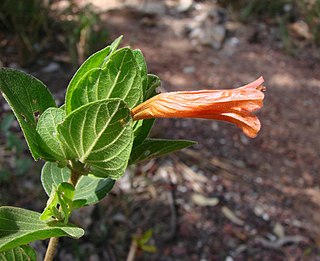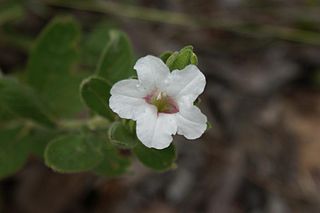
Acanthaceae is a family of dicotyledonous flowering plants containing almost 250 genera and about 2500 species. Most are tropical herbs, shrubs, or twining vines; some are epiphytes. Only a few species are distributed in temperate regions. The four main centres of distribution are Indonesia and Malaysia, Africa, Brazil, and Central America. Representatives of the family can be found in nearly every habitat, including dense or open forests, scrublands, wet fields and valleys, sea coast and marine areas, swamps, and mangrove forests.

Ruellia is a genus of flowering plants commonly known as ruellias or wild petunias. They are not closely related to petunias (Petunia) although both genera belong to the same euasterid clade. The genus was named in honor of Jean Ruelle (1474–1537), herbalist and physician to Francis I of France and translator of several works of Dioscorides.
Ruellia verbasciformis is a species of flowering plant native to the Cerrado vegetation of Brazil. It is endemic to west-central Brazil. This plant is cited in Flora Brasiliensis by Carl Friedrich Philipp von Martius.
Lepidagathis laxiflora is a plant native to the Cerrado vegetation of Brazil. This plant is cited in Flora Brasiliensis by Carl Friedrich Philipp von Martius.

Ruellia simplex, the Mexican petunia, Mexican bluebell or Britton's wild petunia, is a species of flowering plant in the family Acanthaceae. It is a native of Mexico, the Caribbean, and South America. It has become a widespread invasive plant in Florida, where it was likely introduced as an ornamental before 1933, as well as in the eastern Mediterranean, South Asia and other parts of the eastern hemisphere.
Stenandrium pohlii, with Portuguese common names caiapiá or carapiá, is a species of flowering plant in the family Acanthaceae. It is a perennial native to Bolivia, Paraguay, and western, southeastern, and southern Brazil. It is native to Cerrado and Pantanal ecoregions of Brazil. The description of the plant was published in Flora Brasiliensis in 1847.
Stenandrium hirsutum is a plant native to the Cerrado vegetation of Brazil. The description of the plant was published in Flora Brasiliensis in 1847.
Ruellia hypericoides is a species of flowering plant native to southern Paraguay, southern Brazil, northeastern Argentina, and Uruguay. This plant is cited in Flora Brasiliensis by Carl Friedrich Philipp von Martius.

Ruellia villosa is a species of flowering plant native to the Cerrado ecoregion of central and eastern Brazil. This plant is cited in Flora Brasiliensis by Carl Friedrich Philipp von Martius.
Ruellia menthoides is a species of flowering plant native to northern, eastern, and central Brazil, Bolivia, Peru, and Venezuela. In Brazil it grows in the Cerrado ecoregion. This plant is cited in Flora Brasiliensis by Carl Friedrich Philipp von Martius.

Ruellia nitens is a species of flowering plant native to the Cerrado vegetation of central and northeastern Brazil. This plant is cited in Flora Brasiliensis by Carl Friedrich Philipp von Martius.

Ruellia macrantha, or Christmas pride, is a species of flowering plant native to the cerrado vegetation of Brazil. It is often used as an ornamental plant. This plant is cited in Flora Brasiliensis by Carl Friedrich Philipp von Martius.
Ruellia angustior is a plant native of Cerrado vegetation of western Brazil. This plant is cited in Flora Brasiliensis by Carl Friedrich Philipp von Martius.
Gomphrena pohlii is a plant native to Cerrado vegetation in Brazil, specially in São Paulo. This plant is cited in Flora Brasiliensis by Carl Friedrich Philipp von Martius.

Yoma sabina, the Australian lurcher, is a species of butterfly in the family Nymphalidae. It is found in the northern Australasian realm and in Southeast Asia.

Junonia iphita, the chocolate pansy or chocolate soldier, is a butterfly found in Asia.
Strobilanthes penstemonoides is a species of flowering plant in the family Acanthaceae. It occurs in China, Bhutan, India, and Nepal. Its specific epithet has been spelled as penstemonoides, pentstemonoides, and pentastemonoides.

Ruellia drummondiana, also known as Drummond's wild petunia, is a flowering plant endemic to central Texas in the United States. It was first collected by naturalist Thomas Drummond and first described in 1847. R. drummondiana stands up to 3' with an herbaceous dark green ridged stem and purple flowers. Unlike the majority of Ruellia in the United States, R. drummondiana produces fruit with only 2–4 seeds, as opposed to 6–20 as is common throughout the genus.








